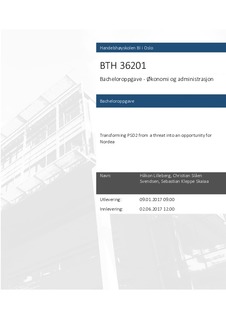| dc.description.abstract | The revised payment services directive (PSD2) is a disruptive piece of legislation
set to remove incumbent banks monopoly on customer account information and
payment services. Along with the EU’s General Data Protection Regulation,
PSD2 compels banks to make much of their valuable data shareable with
designated third parties, allowing new players to enter the market.
The main objective of this papers is to shed light on how the directive affects
Nordea Bank from a strategic perspective. The specific research questions the
study addresses are what the implications of PSD2 are for Nordea, and what
strategy Nordea should pursue to maintain a sustainable competitive advantage.
In our largely qualitative research, we gathered primary source information from
legislative drafts, an interview with a Nordea-spokesperson, and from official
statements by Nordea. Secondary sources like industry white-papers and strategic
management literature were also extensively used.
To tackle the research questions the study considers the implications of PSD2 for
Nordea, conducts an external and internal analysis of the company regarding
PSD2, and explores strategic options Nordea can pursue to respond to the new
directive. The analysis results in three strategic options; Defensive, Opportunistic
and Transformative. The key differentiating point between these is the degree of
commitment to Open Banking, Defensive being full rejection and Transformative
being full commitment, Opportunistic falling somewhere in the middle. These
strategic options are in turn evaluated based on certain criteria. We dismiss the
Defensive approach, as we believe a full rejection of Open Banking would cause
Nordea to quickly fall behind its present and incoming competitors. Taking into
consideration long-term sustainability, a changing competitive landscape, and the
companies capabilities and resource | nb_NO |
